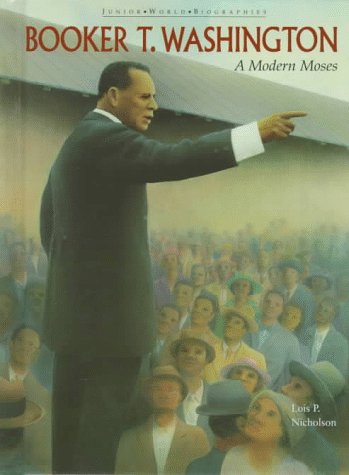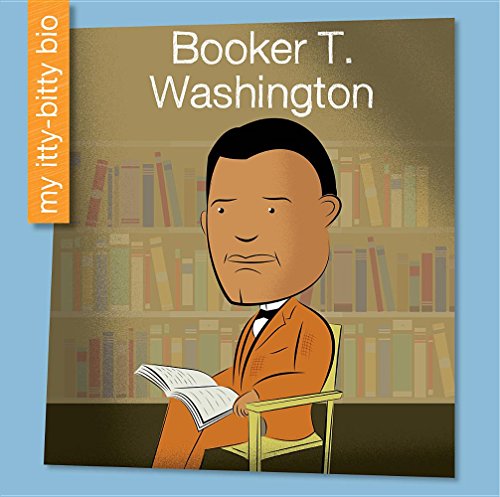-
Who Was Booker T. Washington?
James Buckley Jr., Who HQ, Jake Murray
Paperback (Penguin Workshop, Feb. 6, 2018)Learn how a slave became one of the leading influential African American intellectuals of the late 19th century.African American educator, author, speaker, and advisor to presidents of the United States, Booker Taliaferro Washington was the leading voice of former slaves and their descendants during the late 1800s. As part of the last generation of leaders born into slavery, Booker believed that blacks could better progress in society through education and entrepreneurship, rather than trying to directly challenge the Jim Crow segregation. After hearing the Emancipation Proclamation and realizing he was free, young Booker decided to make learning his life. He taught himself to read and write, pursued a formal education, and went on to found the Tuskegee Institute--a black school in Alabama--with the goal of building the community's economic strength and pride. The institute still exists and is home to famous alumnae like scientist George Washington Carver. X
X
-
The Booker T. Washington Reader
Booker T. Washington
eBook (Start Publishing LLC, Feb. 18, 2013)Here in one omnibus edition are Booker T. Washington's most important books. Washington was constantly, and often bitterly, criticized by his contemporaries for being too conciliatory to whites and not concerned enough about civil rights. It would not be until after his death that the world would find out that he had indeed worked a great deal for civil rights anonymously behind the scenes. Up from Slavery is one of the most influential biographies ever written. On one level it is the life story of Booker T. Washington and his rise from slavery to accomplished educator and activist. On another level it the story of how an entire race strove to better itself. Washington makes it clear just how far race relations in America have come, and to some extent, just how much further they have to go. Written with wit and clarity. In My Larger Education, Booker T. Washington explains how he came by his positions on race relations, by describing the people who influenced him during the founding of Tuskegee Normal and Industrial Institute of Alabama. In Character Building are thirty seven addresses that Booker T. Washington gave before students, faculty, and guests at the Tuskegee Institute. These addresses take the form of timeless advice on a number of subjects. Very motivational and uplifting. Here are six historic essays on the state of race relations during the Reconstruction and early twentieth century, written from the African American point of view. Included are "Industrial Education for the Negro" by Booker T. Washington, "The Talented Tenth" by W.E. Burghardt DuBois, "The Disfranchisement of the Negro" by Charles W. Chesnutt, "The Negro and the Law" by Wilford H. Smith, "The Characteristics of the Negro People" by H.T. Kealing, and "Representative American Negroes" by Paul Laurence Dunbar.
-
Booker T. Washington
Emma E. Haldy, Jeff Bane
eBook (Cherry Lake Publishing, Sept. 1, 2016)The My Itty-Bitty Bio series are biographies for the earliest readers. This book examines the life of Booker T. Washington in a simple, age-appropriate way that will help children develop word recognition and reading skills. Includes a timeline and other informative backmatter.
-
Booker T. Washington
Alan Schroeder, Godfrey Simmons, Recorded Books
Audiobook (Recorded Books, Feb. 5, 2013)From Chelsea House’s Black Americans of Achievement series comes a biography of the great statesman.
-
Booker T. Washington
Don Troy
language (The Child's World, Inc., Jan. 1, 2014)Booker T. Washington rose from his slavery beginnings to become a national leader in education and civil rights. Beginning his career as a teacher and developing into a renowned speaker, Washington's influence is still felt today through Tuskegee University, which he originally founded.
-
Booker T. Washington
Thomas Amper, Jeni Reeves
Paperback (First Avenue Editions TM, Aug. 1, 1997)More than anything, nine-year-old Booker T. Washington longed to go to school, but he had to get a job to earn money for his family. Though the Civil War had freed them from slavery, Booker's family had to work hard to survive. Booker didn't forget his dream. He taught himself the alphabet, studied at night after work, and was able to realize his dream. N
N
-
Who Was Booker T. Washington?
James Buckley, Who HQ, Jake Murray
eBook (Penguin Workshop, Feb. 6, 2018)Learn how a slave became one of the leading influential African American intellectuals of the late 19th century.African American educator, author, speaker, and advisor to presidents of the United States, Booker Taliaferro Washington was the leading voice of former slaves and their descendants during the late 1800s. As part of the last generation of leaders born into slavery, Booker believed that blacks could better progress in society through education and entrepreneurship, rather than trying to directly challenge the Jim Crow segregation. After hearing the Emancipation Proclamation and realizing he was free, young Booker decided to make learning his life. He taught himself to read and write, pursued a formal education, and went on to found the Tuskegee Institute--a black school in Alabama--with the goal of building the community's economic strength and pride. The institute still exists and is home to famous alumnae like scientist George Washington Carver.
-
The Booker T. Washington Reader
Booker T. Washington
Hardcover (Wilder Publications, Jan. 15, 2008)Here in one omnibus edition are Booker T. Washington's most important books. Washington was constantly, and often bitterly, criticized by his contemporaries for being too conciliatory to whites and not concerned enough about civil rights. It would not be until after his death that the world would find out that he had indeed worked a great deal for civil rights anonymously behind the scenes. Up from Slavery is one of the most influential biographies ever written. On one level it is the life story of Booker T. Washington and his rise from slavery to accomplished educator and activist. On another level it the story of how an entire race strove to better itself. Washington makes it clear just how far race relations in America have come, and to some extent, just how much further they have to go. Written with wit and clarity. In My Larger Education, Booker T. Washington explains how he came by his positions on race relations, by describing the people who influenced him during the founding of Tuskegee Normal and Industrial Institute of Alabama. In Character Building are thirty seven addresses that Booker T. Washington gave before students, faculty, and guests at the Tuskegee Institute. These addresses take the form of timeless advice on a number of subjects. Very motivational and uplifting. Here are six historic essays on the state of race relations during the Reconstruction and early twentieth century, written from the African American point of view. Included are "Industrial Education for the Negro" by Booker T. Washington, "The Talented Tenth" by W.E. Burghardt DuBois, "The Disfranchisement of the Negro" by Charles W. Chesnutt, "The Negro and the Law" by Wilford H. Smith, "The Characteristics of the Negro People" by H.T. Kealing, and "Representative American Negroes" by Paul Laurence Dunbar.
-
The Booker T. Washington Reader
Booker T. Washington
Paperback (Wilder Publications, Jan. 15, 2008)Here in one omnibus edition are Booker T. Washington's most important books. Washington was constantly, and often bitterly, criticized by his contemporaries for being too conciliatory to whites and not concerned enough about civil rights. It would not be until after his death that the world would find out that he had indeed worked a great deal for civil rights anonymously behind the scenes. Up from Slavery is one of the most influential biographies ever written. On one level it is the life story of Booker T. Washington and his rise from slavery to accomplished educator and activist. On another level it the story of how an entire race strove to better itself. Washington makes it clear just how far race relations in America have come, and to some extent, just how much further they have to go. Written with wit and clarity. In My Larger Education, Booker T. Washington explains how he came by his positions on race relations, by describing the people who influenced him during the founding of Tuskegee Normal and Industrial Institute of Alabama. In Character Building are thirty seven addresses that Booker T. Washington gave before students, faculty, and guests at the Tuskegee Institute. These addresses take the form of timeless advice on a number of subjects. Very motivational and uplifting. Here are six historic essays on the state of race relations during the Reconstruction and early twentieth century, written from the African American point of view. Included are "Industrial Education for the Negro" by Booker T. Washington, "The Talented Tenth" by W.E. Burghardt DuBois, "The Disfranchisement of the Negro" by Charles W. Chesnutt, "The Negro and the Law" by Wilford H. Smith, "The Characteristics of the Negro People" by H.T. Kealing, and "Representative American Negroes" by Paul Laurence Dunbar.
-
Booker T. Washington
Lois P. Nicholson
Hardcover (Chelsea House Pub, April 1, 1997)Covers the life of Booker T. Washington from his early childhood as a Virginia slave through his rise to founder of the Tuskegee Institute P
P
-
Booker T. Washington
Lola M. Schaefer
Library Binding (Capstone Press, Jan. 1, 2003)Text and photographs introduce the biography of Booker T. Washington, a former African American slave who later became an educator and author. G
G
-
Booker T. Washington
Emma E Haldy, Jeff Bane
Paperback (Cherry Lake Pub, Aug. 1, 2016)The My Itty-Bitty Bio series are biographies for the earliest readers. This book examines the life of Booker T. Washington in a simple, age-appropriate way that will help children develop word recognition and reading skills. Includes a timeline and other informative backmatter. H
H